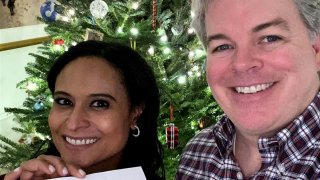
NBC News chief White House correspondent Kristen Welker and her husband, John Hughes, are expecting their first child together in June.
“After years and years of trying, I’m having a baby girl with John and we are so excited," Welker, 44, announced on TODAY Friday. "It's with the help of a surrogate."
The Weekend TODAY co-host and Hughes, a marketing executive, shared their news during Infertility Awareness Week in hopes that their story will give others hope.
Get Tri-state area news delivered to your inbox.> Sign up for NBC New York's News Headlines newsletter.
“I was 40 years old when I married John in March 2017. And we immediately started to try to have a baby,” Welker revealed. “It didn’t work immediately. So we thought, ‘Let’s just go to a doctor as a precaution.’”
Welker’s fertility specialist, Dr. Rafat A. Abbasi, recommended in vitro fertilization, commonly referred to as IVF. Welker was optimistic.
“First round of IVF, it went really well and I thought, ‘I’m going to be pregnant within the next few months, no problem,’” Welker recalled. But then, Welker received devastating news: The lining of her uterus was too thin to carry a child.
U.S. & World
“And I thought, ‘OK, well, let’s fix it. There has to be something that we can do to fix this,’” Welker said.
The next few months were a whirl of tests and appointments.
“I was going into the doctor in between live shots at work and just feeling like … a failure, frankly,” Welker shared.
Welker's Weekend TODAY co-host Peter Alexander remembered watching his friend struggle.
"It was clear that there were days when she was getting bad news," Alexander told TODAY. "She would just sort of break down."
After a heartbreaking two years, Welker finally accepted that she would not be able to carry a child.
“And it was probably the lowest moment and realization that I’ve ever had,” she said. In a heartfelt letter to her unborn daughter, Welker recalls breaking down into tears after talking to her doctor before walking into work. "I felt as though I had let you down because I couldn’t carry you myself," she wrote.
But Welker and Hughes refused to give up on their dream of becoming parents, and after researching their options, they decided to grow their family through surrogacy. "Your daddy and I cried a lot, but we never, ever gave up," Welker wrote in her letter.
Though Welker still carries those painful memories, she has found comfort in their surrogate.
“Being matched with a surrogate is one of the most extraordinary experiences I have ever had,” Welker said.
And Hughes feels the same way.
“Our surrogate has been amazing. I can’t explain just how wonderful she’s been,” Hughes said. “For her this was about giving something to us that she felt a deep connection to.”
When Welker and Hughes met their surrogate, they said they had a lot of questions — and the surrogate, a mother herself, had just as many, if not more, questions for them.
"It was very important to her that she was with a family that she felt were going to be good parents," Welker said.
The first transfer did not work, but the surrogate was pregnant when Welker masterfully moderated the final 2020 presidential debate.
“I can’t wait to tell my daughter that,” Welker said. “I credit her with the fact that I remained calm that night."
Welker has so many stories to share with her little girl.
“I wasn’t expecting to feel such a strong connection to her already, just from seeing her in a monitor,” she said. “All of the tears and the sadness and the setbacks were worth it because she’s worth it. And we cannot wait for that day when we can actually meet her and hug her and hold her.”
Welker said that she and Hughes considered every option, including adoption and surrogacy, and would like to possibly have more children.
Surrogacy "felt like the right first step," Welker said, "but we want to hopefully expand our family even further. We're open to all of the possibilities."
She said that she wanted to be open about her struggles to have a child because it helped her when other people, including TODAY's Dylan Dreyer, spoke out about infertility.
"You gave me so much strength by talking about publicly the struggles that you had trying to have a second child," Welker told Dreyer. " Every time someone opened up about their struggles with fertility, it gave us a little bit more strength."
This story first appeared on TODAY.com. More from TODAY:



